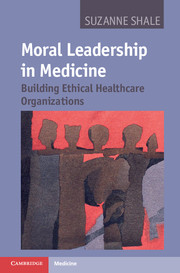Book contents
- Frontmatter
- Contents
- Preface
- Acknowledgements
- Chapter 1 Why medicine needs moral leaders
- Chapter 2 Creating an organizational narrative
- Chapter 3 Understanding normative expectations in medical moral leadership
- Prologue to Chapters 4 and 5
- Chapter 4 Expressing fiduciary, bureaucratic and collegial propriety
- Chapter 5 Expressing inquisitorial and restorative propriety
- Epilogue to Chapters 4 and 5
- Chapter 6 Understanding organizational moral narrative
- Chapter 7 Moral leadership for ethical organizations
- Appendix 1 How the research was done
- Appendix 2 Accountability for clinical performance: individuals and organizations
- Appendix 3 A brief guide to commonly used ethical frameworks
- Index
- References
Chapter 3 - Understanding normative expectations in medical moral leadership
Published online by Cambridge University Press: 05 January 2012
- Frontmatter
- Contents
- Preface
- Acknowledgements
- Chapter 1 Why medicine needs moral leaders
- Chapter 2 Creating an organizational narrative
- Chapter 3 Understanding normative expectations in medical moral leadership
- Prologue to Chapters 4 and 5
- Chapter 4 Expressing fiduciary, bureaucratic and collegial propriety
- Chapter 5 Expressing inquisitorial and restorative propriety
- Epilogue to Chapters 4 and 5
- Chapter 6 Understanding organizational moral narrative
- Chapter 7 Moral leadership for ethical organizations
- Appendix 1 How the research was done
- Appendix 2 Accountability for clinical performance: individuals and organizations
- Appendix 3 A brief guide to commonly used ethical frameworks
- Index
- References
Summary
The purpose of this chapter is to understand the nature of normative expectations; to observe how they differ from, and how they interact with, other elements in our moral life; and to consider their expression in narratives of medical moral leadership.
The concept of normative expectations, and the associated concept of reactive attitudes, were both introduced for the first time in Chapter 2. Normative expectations reflect our understanding of the responsibilities that we each owe to one another, and our views on how these responsibilities ought to be discharged. Normative expectations give rise to a keen sense that we ‘have a right’ to demand certain actions of others. Normative expectations are also frequently accompanied by strongly felt ‘reactive attitudes’ of anger, outrage, resentment, disgust, dismay and the like. These emotions arise when we perceive that we have been let down, particularly when we have been let down in relation to something to which we felt entitled.
- Type
- Chapter
- Information
- Moral Leadership in MedicineBuilding Ethical Healthcare Organizations, pp. 66 - 91Publisher: Cambridge University PressPrint publication year: 2011



